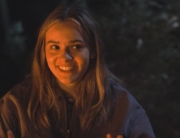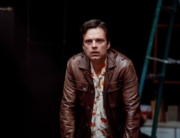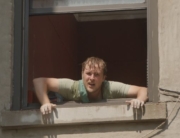Written & Directed by David Gordon Green, based on the film Either Way by Hafsteinn Gunnar Sigurdsson
Produced by Lisa Muskat, Derrick Tseng, Craig Zobel, James Belfer & Green
Released by Magnolia Pictures
USA. 94 min. Rated R
With Paul Rudd, Emile Hirsch, Lance Legault & Joyce Payne
Before David Gordon Green went Hollywood and started to make big movies like Pineapple Express, Your Highness, and The Sitter (which marked a starker departure and some might say was ill-advised), he was known for making small, intimate, dramas that varied with genre—All the Real Girls was a romance; George Washington, a coming of age; Undertow, a thriller—but each carried a distinct eye for human interaction, nuance, and the poetry that can be found in nature. Green’s main influence, Terence Malick, even produced Undertow. This isn’t to say he didn’t use stars. Even far back as Girls he cast Zooey Deschanel, and in Snow Angels (a Best Dramatic Film No One’s Seen), he gave Sam Rockwell one of his career highlights.
So now with Prince Avalanche he returns to that more intimate territory. Actually, you can say that again—this time he has just two actors, with the exception of a handful of scenes, for the whole duration of the film. Paul Rudd (Paul Rudd), a road worker circa 1988, paints yellow divider lines on the roads out in Wherever-the-Hell Texas in a kind of partnership with his girlfriend’s younger brother, Lance (Emile Hirsch).
Lance would rather be anywhere than in this laborious and often boring job—not to mention that being an early-20-something horn-dog, he constantly talks and thinks about getting laid. While at work, Alvin learns German via audio tape to impress his girlfriend Madison, and he doesn’t understand, with the straightest face possible, how anyone does NOT know how to make a fire or fish for themselves or do outdoorsy things—he can’t connect with Lance. But over the course of the few days that we see them together, working on this road and going on about their personal concerns, they will bond and have their ups and downs along the way.
It surprised me greatly that this was inspired by another film, Either Way from Iceland, made only a couple years ago (the film is available on Vanguard), and that Green put this film together very quickly after watching a friend’s copy of the film. He called up friend Paul Rudd and round up a crew to shoot out in the middle of nowhere. And yet, upon further reflection, it made a lot of sense, almost perfectly: what better way to get back to one’s roots after going through the Hollywood machine,while taking along some of what he’s learned as an artist and sharing that with the actors involved?
Prince Avalanche is not only Green’s most satisfying film in a long while, it’s the sort that’s at times very unassuming, telling its story at a leisurely but never tedious pace (the actors help with that, which I’ll get to in a moment), and it even has some dream-like passages. At one point while off on his own, Alvin walks about in the woods and comes across a home that is now rubble. An old woman (Joyce Payne) searches through this burned wasteland for her once-belongings, ruminating with a confused mind about her past, and Rudd for a moment helps her look for objects before slumping in a chair. How Rudd interacts with her and this ruined landscape doesn’t really move the story forward in any conventional way. And really, why should it? Green invites the audience: come along on a diversion, see some unusual things out in these woods.
This isn’t to say the film doesn’t have a story, but it’s not about that. These characters do have things that happen to them, some very bad, some eventful, that will uproot their lives and relationships that may change them forever, or might just be another blip on their respective timelines. But to the very end, the film remains fascinating, like an absurdest play a la Beckett.
I have been a little worried about Rudd for a while. In film after film (mostly for Apatow or his partners), he has never been unlikable, but he has sometimes coasted on playing the affable, slightly dorky/adorable guy. But Alvin is a character Rudd hasn’t really played before, a man with real quirks, a sense of right and wrong, and a love for this girlfriend who we never see (that’s actress/director Lynn Shelton we hear, by the way). And when Rudd has to show Alvin going into a tailspin, he can bring it and it’s affecting. Lance, though, is not quite as complicated or as screwed up. But Hirsch, too, makes his part a complex being with predilections, like a tendency to mouth off, and so on.
It’s not as deep as a Waiting for Godot—though some film school brats out there may want to deconstruct some of the deeper meanings with the supporting characters of the old woman and a wry truck driver, who conveniently always has booze with him—but so what? Green’s Prince Avalanche is an idiosyncratic Movie About Not Too Much, the kind that cropped up more often in the more eccentric American cinema of the ’70’s and ’80’s. The dialog is never too loose (it’s not a mumblecore movie, for example), but it’s not beholden to strict plot points either. That it’s also very funny at times, all from Rudd’s comic timing and the flights of bizarre bits of action and behavior, makes it remarkable.

















Leave A Comment